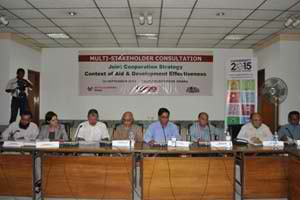The Aid Accountability Group, with assistance from the Reality of Aid Network, organized a multistakeholder consultation on the Joint Cooperation Strategy (JCS) in the context of aid and development effectiveness, 20 September 2010 in Dhaka, Bangladesh.
The JCS, signed by the Government of Bangladesh and 18 Development Partners (including ADB and WB apart from donor countries) on June 2010, is a strategy for signatories to work together in the spirit of PD and AAA, aiming to translate international commitments on aid into real actions for improved aid delivery and poverty reduction in Bangladesh.
Different positions were put forth during the consultation. According to Dr Qazi Khalikauzzaman (Chairman of Pally Karmasahayak Foundation), aid stands at less than 2 percent of the national budget but the conditionalities attached are unbearable and lead to worsening poverty. This was supported by economist and Professor ANu Muhammad, who stated that a net foreign aid at 1b USD, 90% is spent on logistics, travel and consultancy fees. Instead, the country should concentrate on domestic resource mobilization and remittances.
Mr Bo Sundstrom of DFID clarified however that annual foreign aid to Bangladesh is more than USD2 billion per year and increasing. He also added it’s not true 90% of aid is spent on logistics and consultancy, saying that the World Bank for example charge 1% of the total amount as administrative cost of other donors’ money. DFID’s total programme budget for Bangladesh is £150 million and £4 million per year is allocated to administrative cost. Furthermore, he said that NGOs usually charge 5-10% of the total budget for administrative costs to pay for local salaries, while UN allocates 5-7%. The rest of the money, he claims, goes back to Bangladesh in the form of social services and goods.
Former advisor of Finance of Caretaker Government, Dr ABM Mirza Azizul Islam said that the country is not in a position to reject aid because it will lead to increased inflation and hamper development. He instead insisted making aid money more effective, committing to principles enshrined in the PD and AAA and hold donors and governments accountable.
While donors and some government representatives claim that they are on track in realizing aid effectiveness, JCS has been criticized by some CSO participants as lacking transparency and inclusiveness because CSOs were not included in the process. CSOs demanded that the aid negotiation process should always be made public.
The important role of CSOs was also emphasized, with a challenge to ensure accountability of donors and government and develop a set of principles for a more effective aid.
The consultation was attended by 150 participants, including media, CSOs, government representatives, parliamentarians, donors and the focal persons for the monitoring of PD Evaluation 2.
The multi-stakeholder consultation was seen as a positive step towards a broader dialogue and effective engagement among the different stakeholders. AAG members will sustain the process by convening a few days after the event to line up follow through activities.
For more information, please visit the VOICE website at http://www.voicebd.org/

